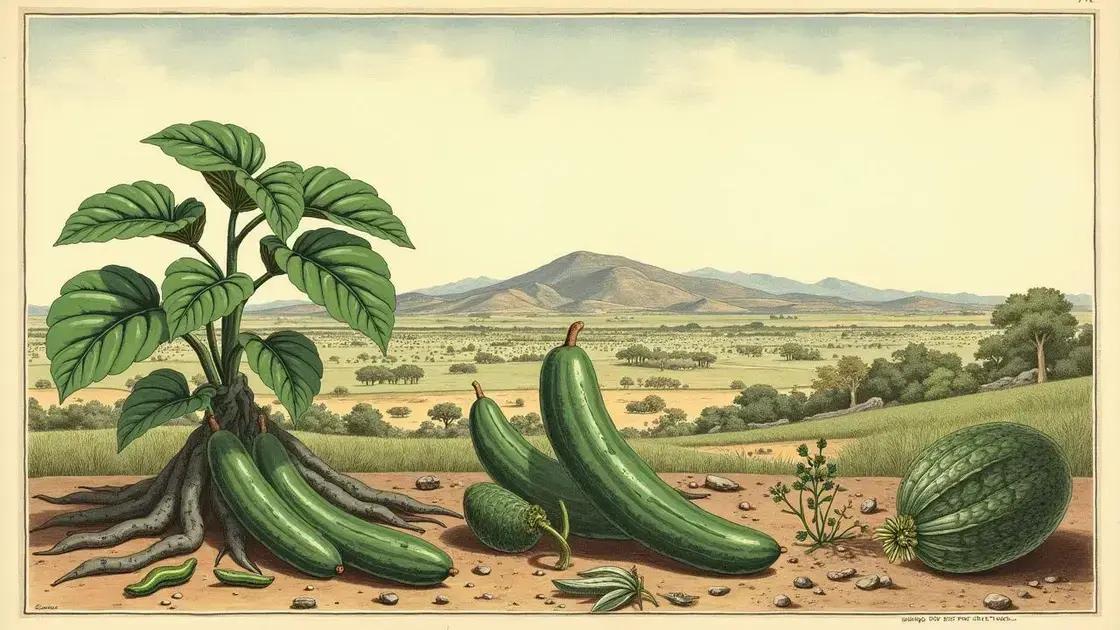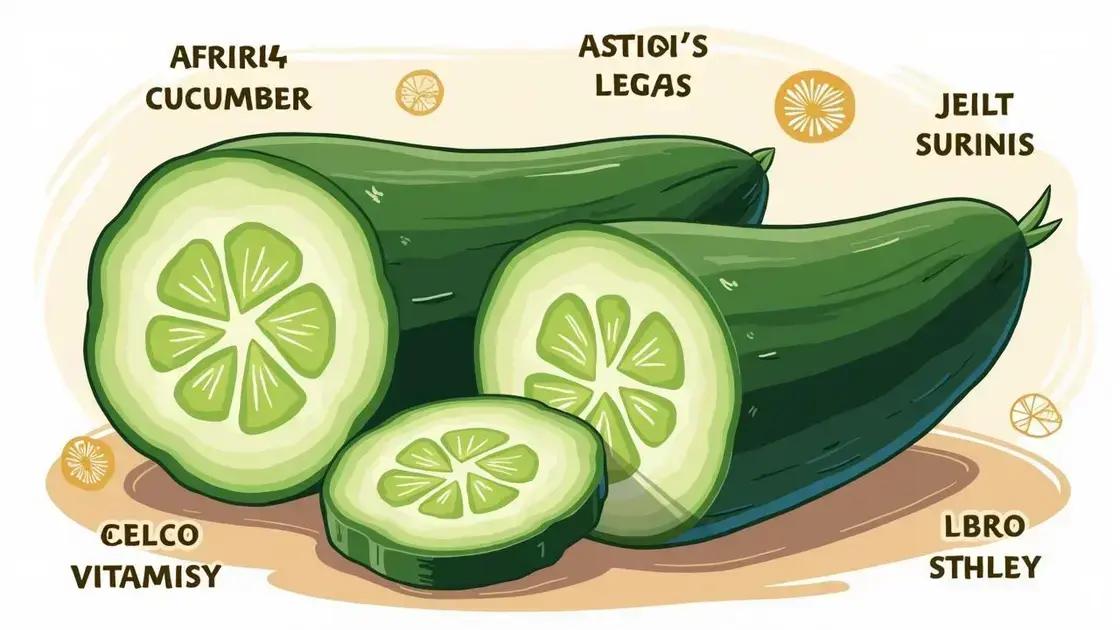African Cucumber, also known as Kiwano, is a unique fruit native to sub-Saharan Africa, celebrated for its refreshing taste, high nutritional value, and significant cultural presence. It is rich in vitamins A and C, dietary fiber, and antioxidants, making it a healthy addition to salads, smoothies, and various dishes.
The African Cucumber, often referred to as the Kiwano, is a unique fruit with a rich history. Native to Africa, this intriguing fruit has captivated taste buds worldwide. Exploring the origins of the African Cucumber reveals not only its culinary uses but also its nutritional benefits and cultural significance. From its ancient roots to modern popularity, join us as we delve into the fascinating journey of this exotic fruit.
Historical Background of African Cucumber

The African Cucumber, also known as Kiwano, has an interesting historical background. Native to the sub-Saharan region of Africa, this fruit has been cultivated for centuries. The indigenous peoples of Africa recognized its unique taste and nutritional value, using it in various traditional dishes.
Ancient Beginnings
Archaeological findings suggest that the cultivation of African Cucumber dates back thousands of years. Ancient African communities grew this fruit not only as a food source but also for its medicinal properties. They believed it could treat a variety of ailments.
Global Exploration and Spread
In the late 19th century, explorers and traders began to spread the African Cucumber beyond Africa’s borders. Its distinct appearance and flavor caught the attention of many, leading to its popularity in other parts of the world, including Europe and the Americas.
Modern Cultivation
Today, the African Cucumber is grown in various regions, including California and New Zealand. With its growing popularity, farmers cultivate it for both local consumption and export. This unique fruit has established itself in international markets.
Symbol of Resilience
The journey of the African Cucumber represents resilience. From its ancient roots to its contemporary status, this fruit has adapted through the ages, retaining its significance in culinary practices and cultural traditions.
Culinary Uses of African Cucumber

The African Cucumber is not just unique in appearance; it is also a versatile ingredient in the kitchen. One of its most popular uses is in salads. The cucumber’s refreshing crunch and mildly sweet flavor enhance salads, making them lively and nutritious.
In Cooking
The flesh of the African Cucumber can be eaten raw or cooked. When added to stir-fries, it brings a crisp texture and a hint of sweetness. It pairs well with various vegetables and meats, making it an excellent option for diverse dishes.
In Beverages
This intriguing fruit is also used in beverages. Smoothies featuring African Cucumber showcase its refreshing taste. Some people blend it with yogurt and honey for a delicious drink that is both satisfying and nutritious.
As a Garnish
Chefs often utilize the African Cucumber as a decorative garnish. Its vibrant color and unique shape can elevate the presentation of any dish. Slice it thinly and place it on top of meats or alongside dips for a striking visual appeal.
In Traditional Dishes
In traditional African cuisine, African Cucumber appears in several recipes. It is often used in stews, giving these dishes a fresh twist. By adding this fruit, cooks achieve a blend of flavors that connects with cultural roots and culinary heritage.
Nutritional Benefits of African Cucumber

The African Cucumber is not only tasty but also packed with numerous nutritional benefits. This fruit is low in calories, making it an excellent choice for those looking to maintain a healthy weight.
Rich in Vitamins and Minerals
African Cucumber is an excellent source of vitamins A and C. Vitamin A is vital for maintaining healthy vision, skin, and immune function. Meanwhile, vitamin C helps promote healthy skin and supports the immune system.
Hydration
With its high water content, the African Cucumber is very hydrating. Staying hydrated is crucial for overall health, aiding digestion, and keeping skin supple. Including this fruit in your diet is a delicious way to boost your fluid intake.
Dietary Fiber
This unique fruit contains dietary fiber, which is essential for digestive health. Fiber helps regulate bowel movements and can prevent constipation. A diet high in fiber can also promote a feeling of fullness, which may aid in weight management.
Antioxidant Properties
The antioxidants found in African Cucumber help combat oxidative stress in the body. Antioxidants are important for neutralizing free radicals, which can damage cells and lead to chronic diseases.
Cultural Significance of African Cucumber

The African Cucumber holds a special place in various African cultures. Beyond its nutritional and culinary uses, this fruit is woven into the fabric of many traditions and practices across the continent.
Traditional Celebrations
In some communities, African Cucumber is featured in ceremonial feasts and gatherings. It is often used in dishes prepared for festivals and special occasions, symbolizing abundance and joy.
Symbol of Fertility
This fruit is occasionally regarded as a symbol of fertility in specific cultures. Its vibrant appearance and growth pattern contribute to its association with life and vitality. In traditional rituals, it may be included for blessings of fertility.
Educating Future Generations
African Cucumber is also part of the educational curriculum in some regions. Children learn about its historical significance and its uses in cooking, promoting a connection to their cultural heritage. Such lessons help keep traditional knowledge alive.
Folklore and Stories
This fruit is woven into local folklore and stories. Many tales celebrate the Kiwano as a miraculous fruit that can bring good luck or prosperity. These stories are shared among families and communities, often passed down through generations.
In Summary: Exploring the Richness of African Cucumber
The African Cucumber, or Kiwano, is not merely a unique fruit; it is a treasure trove of history, culture, and nutrition. From its ancient origins in Africa to its contemporary culinary applications, this fruit has captured the interest of many.
Understanding the nutritional benefits highlights its value as a hydrating and vitamin-rich food, making it a smart choice for health-conscious individuals. Furthermore, the cultural significance of African Cucumber adds depth, connecting it to traditions, folklore, and community celebrations.
As we continue to explore the origins and uses of the African Cucumber, it becomes clear that this remarkable fruit is an important part of our global agricultural heritage, deserving of our attention and appreciation.
FAQ – Frequently Asked Questions about African Cucumber
What is African Cucumber?
African Cucumber, also known as Kiwano, is a unique fruit native to sub-Saharan Africa, recognized for its distinctive shape and flavor.
What are the nutritional benefits of African Cucumber?
African Cucumber is low in calories, high in vitamins A and C, rich in dietary fiber, and has antioxidant properties, making it a healthy addition to your diet.
How can I incorporate African Cucumber into my meals?
You can use African Cucumber in salads, smoothies, stir-fries, or as a garnish for various dishes, enhancing taste and presentation.
Is African Cucumber culturally significant?
Yes, African Cucumber holds cultural significance in various African communities, featured in traditional dishes and celebrated in local folklore and ceremonies.
Where can I buy African Cucumber?
African Cucumber can often be found in specialty grocery stores, farmers’ markets, and international food markets, especially in regions with diverse produce.
How is African Cucumber grown?
African Cucumber is typically grown in warm climates and requires well-drained soil, ample sunlight, and regular watering to thrive.













